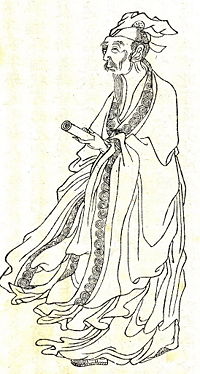Bai Juyi
| Names | |
|---|---|

| |
| Chinese: | 白居易 |
| Pinyin: | Bó Jūyì or Bái Jūyì |
| Wade-Giles: | Po Chü-i or Pai Chü-i |
| Zì 字: | Lètiān 樂天 |
| Hào 號: | Xiāngshān Jūshì 香山居士 Zuìyín Xiānshēng 醉吟先生 |
| Shì 謚: | Wén 文 (hence referred to as Bái Wéngōng 白文公) |
- This is a Chinese name; the family name is Bai.
Bai Juyi (Chinese: 白居易; pinyin: Bái Jūyì; Wade-Giles: Pai Chüi, 772–846) was a Chinese poet of the Tang dynasty. His poems are not cheerful, and were themed around his responsibilities as a governor of several small provinces to sympathise with his people. He is renowned in Japan as well, where he is called Haku Rakuten.
Life
Bai Juyi was born in Xinzheng to a poor but scholarly family. At the age of ten he was sent away from his family to be educated near Chang'an. He passed the jinshi degree in 800. His official career was initially successful: he was a Member of the Hanlin Academy and Reminder of the Left from 807 until 815, when he was exiled for remonstrating too forcefully. His career resumed when he was made Prefect of Hangzhou (822-824) and then Suzhou (825-827).
Works
He wrote over 2,800 poems, which he had copied and distributed to ensure their survival.
He is most notable for the accessibility of his work. It is said that he rewrote any part of a poem which one of his servants was unable to understand. He tried to use simple language and direct themes. Two of his most famous works are the long narrative poems Song of Eternal Sorrow, which tells the story of Yang Guifei, and Song of the Pipa Player. Like Du Fu, he also had a strong sense of social responsibility, and he is also well-known for his satirical poems, such as The Elderly Charcoal Seller. Bai Juyi's accessibility made him extremely popular in his lifetime in both China and Japan, and he continues to be so today.
ReferencesISBN links support NWE through referral fees
- Pg. 330 of A History of World Societies, Fourth Edition by McKay Hill Buckler. Published by Houghton Mifflin 1999.
- Gu, Xuejie, "Bai Juyi". Encyclopedia of China (Chinese Literature Edition), 1st ed.
External links
- Translations of Chinese poems
- Chinese poems in translation
- Six Bai Juyi's poems included in 300 Selected Tang Poems, translated by Witter Bynner
- Nienhauser, William H (ed.). The Indiana Companion to Traditional Chinese Literature. Indiana University Press 1986. ISBN 0-253-32983-3
Credits
New World Encyclopedia writers and editors rewrote and completed the Wikipedia article in accordance with New World Encyclopedia standards. This article abides by terms of the Creative Commons CC-by-sa 3.0 License (CC-by-sa), which may be used and disseminated with proper attribution. Credit is due under the terms of this license that can reference both the New World Encyclopedia contributors and the selfless volunteer contributors of the Wikimedia Foundation. To cite this article click here for a list of acceptable citing formats.The history of earlier contributions by wikipedians is accessible to researchers here:
The history of this article since it was imported to New World Encyclopedia:
Note: Some restrictions may apply to use of individual images which are separately licensed.
